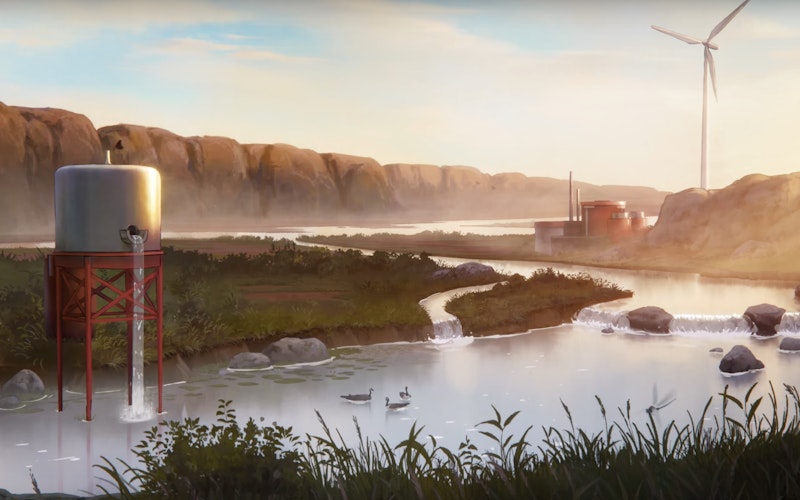
Games
Caring for Creation in Terra Nil
The concept of purification is a powerful and ancient one, as well as a hope that lies at the heart of the Christian faith. We have all experienced toxins corrupting our bodies and our communities, so it’s deeply satisfying to remove rot and pollution—physical and spiritual. This idea is also at the heart of Terra Nil, a lovely new indie video game about purifying a planet’s polluted ecosystems.
Through strategic deployment of advanced ecotechnology, the player has to earn a kind of eco-currency and reinvest it in steadily more complicated solutions, cleansing the formerly dead space of its toxins, leading to an explosion of plant growth and animal life.
The game is delightfully peaceful and lush. The graphics are a step up from pixel art, but not hyper-realistic. The Minecraft-like piano music tinkles relaxedly in the background, as more and more technologies unlock and migratory birds, wildflowers, forests, lichen-filled tundra, and reefs full of jellyfish return. I frequently experienced a sense of delight as I cleaned and complexified this little sandbox. It sufficiently challenged my gamer soul without being too frustrating. If you like peaceful games, as I do, I think you will enjoy Terra Nil.
This is ultimately a hopeful game. It suggests that the continual problems we have managing our earth can be solved. What grabbed my interest, however, was how the game models purification. In spite of its emphasis on nature, this is, at heart, a story about technology. The game mourns the loss of organic life, yet the thing that will bring it back are green tech tools like windmills for power, toxin scrubbers for cleaning the soil, and cloud seeders for increasing humidity. While I loved playing the game, it did make me wonder if this reliance on technology is an entirely positive thing.
I have to confess I am a green tech enthusiast. My wife and I just bought an electric vehicle this spring. I eagerly read news stories about alternative energy systems and new kinds of batteries and innovative mass transit that I believe will help our world address the massive ecological crises we face. But my fascination has its flaws. For starters, technological solutions never solve all our problems. Each new tool may fix a problem, but can lead to unintended consequences. For example, our quest to electrify the world has created massive pressure to build batteries that require rare metals typically mined in environmentally, socially, and economically devastating ways.
I frequently experienced a sense of delight as I cleaned and complexified this little sandbox.
On a spiritual level, reliance on technology is also problematic. Sociologist and Christian theorist Jacques Ellul wrote extensively about what he saw as the poison of la technique, a term that doesn’t translate easily into English but which I would describe as “the technological attitude.” He saw this as a spiritual force that polluted Western society, a belief that whatever problem we face, the solution is to find a technology that makes us more efficient and powerful.
Ellul argues that we are so dominated as a culture by la technique that we have completely lost control of our technology. It now runs us. We have so thoroughly adopted the notion that faster, stronger, more efficient is better that we never stop to ask what end the speed, power, and cost savings are serving. La technique is, essentially, a satanic force: tools have a way of destroying us. The logic of the factory gave us cheap, mass-produced goods that improved our comfort and safety, yet it also gave us the death machine of the Holocaust.
I don’t think I’m quite on board with Ellul about the all-encompassing power of the technological attitude or mindset, but I think he points to a very real danger. Our techno-utopian discourse certainly plays into the same we-can-do-it-ourselves spirit at the heart of the story of the Tower of Babel.
Christians believe in a Creator God who created an incredibly intricate universe. The beauty of creation is a gift we have destroyed and polluted. It is right and good that we wish to purify the damage we have done. I’m not proposing we should stop our efforts at doing so. Christian organizations like A Rocha and many non-Christian initiatives do great work in restoring God’s creation and moving us toward a sustainable form of development.
But the best attitude towards this work is one of humble servanthood, following God’s lead, rather than thinking we’re going to fix the mess we made. A healthy environmentalism learns from nature much more than it tries to program it. Terra Nil actually models this at times. For instance, one of the key tools in the deciduous ecosystem is a beehive; bees facilitate flower growth, which is an important step in turning fields into forests. Although the beehives are part of a larger, mechanistic model of restoring natural territory, the game does suggest in this and other ways that maybe we as humans can’t do everything. The processes God has built into creation must play a role.
The desire to cleanse and fix is, done the right way, a good and noble thing. Christians playing Terra Nil should remember, however, that we are never going to solve the world’s problems on our own.
Topics: Games